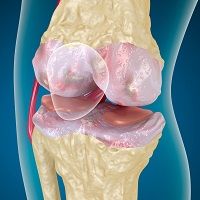Psychiatric Drug May Slow Progression of Osteoarthritis
A widely accessible medication commonly used to treat psychiatric disorders may also inhibit the damaging effects of osteoarthritis.

A widely accessible medication commonly used to treat psychiatric disorders may also inhibit the damaging effects of osteoarthritis.
About 51.8 million, or 22.1%, of US adults were living with some form of arthritis in 2012, according to the Centers for Disease Control and Prevention. With osteoarthritis being the most common form of the condition, an existing pharmaceutical may offer a new option for treatment. Lithium chloride, typically used as a mood stabilizer for conditions such as bipolar disorder, was found to slow the degradation of cartilage.
A collaborative team from Queen Mary University of London (QMUL) and the University of Otago in New Zealand exposed bovine cartilage samples to inflammatory molecules to create an arthritis-like effect. Then the samples were treated with lithium chloride for 12 days, as explained in the Journal of Orthopaedic Research. The drug proved to stop interleukin-1β signaling which prevented the degradation and loss of mechanical integrity in the cartilage.
“While we’re still at an early stage in researching lithium’s effects on cartilage and its suitability as a treatment, the possibility that an already widely available pharmaceutical could slow its progress is a significant step forward,” co-author Martin Knight, BEng, MSc, PhD, of QMUL, said in a news release.
Previous research indicated that lithium could negatively impact patients with osteoarthritis; however, the current study squashed that controversial point. When the team exposed rats to dietary lithium for 9 months, they did not develop the condition.
“Moreover, lithium chloride did not induce the expression of catabolic enzymes in human articular chondrocytes,” the authors noted.
Additional research needs to be conducted in order to further understand the effects of lithium on the chronic degenerative disease, but the findings should not be discounted.
“Osteoarthritis has a devastating impact on the lives of many people in the UK and it’s vital that we look for novel ways to prevent it,” Knight said.